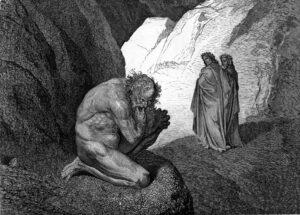“Pape Satàn, pape Satàn aleppe!”
so Plutus, with his grating voice, began.[“Pape Satàn, pape Satàn aleppe!”,
cominciò Pluto con la voce chioccia.]Dante Alighieri (1265-1321) Italian poet
The Divine Comedy [Divina Commedia], Book 1 “Inferno,” Canto 7, l. 1ff (7.1-2) (1309) [tr. Mandelbaum (1980)]
(Source)
There is a conflation in this speaker between Pluto, Roman God of the Underworld (modeled after the Greek Hades), and Plutus, Roman God of Wealth (both given as Pluto in Italian). The Romans themselves sometimes conflated the two figures (wealth, in the form of precious metals and gems, coming from below the ground). Given the sinners in this Circle (hoarders and wasters), the connection with wealth is probably intentional.
The actual words spoken remain something of a mystery. Dayman notes the phrase has "employed the ingenuity of commentators," and Butler that it has generated "commentary enough to fill a very large volume," but Sayers notes of the explanations "none of them is very convincing." Musa says, "this line, while it has never been interpreted satisfactorily, has certainly been interpreted variously." The line even gets its own Wikipedia entry.Earlier translators try to make sense of it; later ones just record Dante's original words and then speculate in footnotes.
The connection between pape and papa (Pope) is considered significant by most scholars, though papae is also Latin for an exclamation of surprise (παπαί in Greek), like "Oh!" Satan is the Hebrew term for "Adversary" and usually used to represent the master of Hell (though the name is not used lower down in Inferno when he is actually encountered); some scholars suggest Dante the Pilgrim, himself, is being called an adversary/enemy by the speaker, who acts as a guard. Some have tried to connect aleppe to the first letter of the Hebrew alphabet, aleph, with an implication of primacy (as of God, or, presumptively, Satan) or an an exclamation of grief or pain (as it was used in Medieval times).
In sum, this seems to be either infernal gibberish, or (as Virgil appears to understand it) some metaphysical jargon invoking the Devil in surprise or anger over a living mortal's intrusion. I'm mostly just amused by the array of accents / diacritical marks various translators use.
(Source (Italian)). Alternate translations:
O Satan, Satan, Oh alas! exclaim'd
Pluto, expressing both surprise and dread.
[tr. Rogers (1782)]
"Prince of the Fiends," a voice exclaim'd, "arise;
Behold thy realms expos'd to mortal eyes!"
[tr. Boyd (1802)]
“Ah me! O Satan! Satan!” loud exclaim’d
Plutus, in accent hoarse of wild alarm.
[tr. Cary (1814)]
"Ho! Satan, ho! -- Ho! Satan, ho! -- alas!"
Plutus began with stammering accents hoarse.
[tr. Dayman (1843)]
"Pape Satan! pape Satan, aleppe!" began Plutus, with clucking voice.
[tr. Carlyle (1849)]
"Pape Satan! Pape Satan! Aleppe!"
Began then Pluto, with affrighted voice.
[tr. Bannerman (1850)]
"Papè Satan, papè Satan, aleppe,"
Plutus began with raucous voice to cry.
[tr. Johnston (1867)]
"Papë Satàn, Papë Satàn, Aleppë!"
Thus Plutus with his clucking voice began.
[tr. Longfellow (1867)]
"Pape Satan pape Satan aleppe," began Pluto with his clucking voice.
[tr. Butler (1885)]
"Ah, marvel, Satan! marvel, King of Hell!"
Pluto began with his hoarse strident shout.
[tr. Minchin (1885)]
“Pape Satan, pape Satan aleppe,” -- began Pluto with his clucking voice.
[tr. Norton (1892)]
"Pape Satan, pape Satan aleppe," Pluto began with grating voice.
[tr. Sullivan (1893)]
"Papè Satàn, papè Satàn, aleppè,"
Plutus with voice discordant made beginning.
[tr. Griffith (1908)]
“Pape Satan, Pape Satan, aleppe,”
began Plutus with clucking voice.
[tr. Sinclair (1939)]
"Pape Satan, aleppe, pape Satan!"
[...] Plutus thus with clucking noise began.
[tr. Binyon (1943)]
"Papè Satan, papè Satan aleppe,"
Pluto 'gan gabble with his clucking tongue.
[tr. Sayers (1949)]
"Papa Satán, Papa Satán, aleppy,"
Plutus clucked and stuttered in his rage.
[tr. Ciardi (1954)]
"Pape Satàn, pape Satàn aleppe!" Plutus began with a clucking voice.
[tr. Singleton (1970)]
"Pape Satàn, pape Satàn aleppe!"
the voice of Plutus clucked these words at us.
[tr. Musa (1971)]
"Papè Satan, papè Satan aleppé,"
Plutus began, in his raucous voice.
[tr. Sisson (1981)]
"Papè Satan, papè Satan, aleppe,"
Plutus began in a gutteral, clucking voice.
[tr. Pinsky (1994)]
"Pape Satàn, pape Satàn aleppe!" began Plutus with his clucking voice.
[tr. Durling (1996)]
"Pape Satan, pape Satan aleppe," Plutus, began to croak.
[tr. Kline (2002)]
"Pappy Satin Papish Satan Alibi!"
barked Pluto in his fluent poppycock.
[tr. Carson (2002)]
"Popoi Satan, popoi Satan! Alezorul!"
So Plutus -- shrill voice clucking on -- began.
[tr. Kirkpatrick (2006)]
"Pape Satàn, Pape Satàn, aleppe!"
burst out Plutus in his raucous voice.
[tr. Hollander/Hollander (2007)]
"Satan's the Pope, Satan's the Pope, hurray!"
Plutus began, clucking like a mother hen.
[tr. Raffel (2010)]
"Pope Satan, Pope Satan, Alley Oop!"
Plutus spit this out in his raspy voice.
[tr. Bang (2012)]
"The Pope pops Satan, Satan pips the Pope,"
Plutus barked raucous nonsense.
[tr. James (2013)]
Quotations about:
Satan
Note not all quotations have been tagged, so Search may find additional quotes on this topic.
It’s dated, called a fable; men are clever,
But they are just as badly off as ever:
The Evil One is gone, the evil ones remain.[Er ist schon lang in Fabelbuch geschrieben;
Allein die Menschen sind nichts besser dran,
Den Bösen sind sie los, die Bösen sind geblieben.]Johann Wolfgang von Goethe (1749-1832) German poet, statesman, scientist
Faust: a Tragedy [eine Tragödie], Part 1, sc. 9 “Witches’ Kitchen,” l. 2557ff [Mephistopheles] (1808-1829) [tr. Kaufmann (1961)]
(Source)
On humanity no longer believing in "Satan."
Some translations (and this site) include the Declaration, Prelude on the Stage, and Prologue in Heaven as individual scenes; others do not, leading to their Part 1 scenes being numbered three lower.
(Source (German)). Alternate translations:
This many a day 'tis written down a fable;
Yet men are nowise winners in the game.
They're rid of the Evil One, the Evil still are able.
[tr. Latham (1790)]
That's been known as a fable many a season;
But men have things no better for that reason.
Free are they from the Evil One; the evil are still here.
[tr. Priest (1808)]
It has been long written in story books; but men are not the better for that; they are rid of the wicked one, the wicked have remained.
[tr. Hayward (1831)]
To fable-books it now doth appertain;
But people from the change have nothing won.
Rid of the evil one, the evil ones remain.
[tr. Swanwick (1850)]
It has long since to fable-books been banished;
But men are none the better for it; true,
The wicked one, but not the wicked ones, has vanished.
[tr. Brooks (1868)]
It's long been written in the Book of Fable;
Yet, therefore, no whit better men we see:
The Evil One has left, the evil ones are stable.
[tr. Taylor (1870)]
That name has had its station long assigned
With Mother Bunch; and yet I cannot see
Men are much better for the want of me.
The wicked one is gone, the wicked stay behind.
[tr. Blackie (1880)]
It's now a name for fairy tales and fables;
the people are as miserable as ever --
the Evil One is gone, the evil ones remain.
[tr. Salm (1962)]
It's been consigned to storybooks for youngsters;
Mind you, men are no better off for that.
The Fiend is gone, the fiends are still amongst us.
[tr. Arndt (1976)]
The name has been a myth too long.
Not that man's any better off -- the Evil One
They're rid of, evil is still going strong.
[tr. Luke (1987)]
Since God knows when it belongs to mythology,
But that's hardly improved the temper of humanity.
The Evil One's no more, evil ones more than ever.
[tr. Greenberg (1992)]
It only comes in fairy stories nowadays.
But even so, humanity's no better off --
The Evil One has gone, they've kept their evil ways.
[tr. Williams (1999)]
It’s written in story books, always:
Men are no better for it, though:
The Evil One’s gone: the evil stays.
[tr. Kline (2003)]
The best way to drive out the devil, if he will not yield to texts of Scripture, is to jeer and flout him, for he cannot bear scorn.
Martin Luther (1483-1546) German religious reformer
Table Talk
(Source)
Variations:
- "The best way to drive out the devil, if he will not go for texts of Scripture, is to jeer and flout him, for he cannot bear scorn."
- The best way to expel the devil, if he will not depart for texts from Holy Scripture, is to jeer and flout him. [Source]
I know a number of highly sensitive and intelligent people in my own communion who consider as a heresy my faith that God’s loving concern for his creation will outlast all our willfulness and pride. No matter how many eons it takes, he will not rest until all of creation, including Satan, is reconciled to him, until there is no creature who cannot return his look of love with a joyful response of love […] Some people feel it to be heresy because it appears to deny man his freedom to refuse to love God. But this, it seems to me, denies God his freedom to go on loving us beyond all our willfulness and pride. If the Word of God is the light of the world, and this light cannot be put out, ultimately it will brighten all the dark corners of our hearts and we will be able to see, and seeing, will be given the grace to respond with love — and of our own free will.







